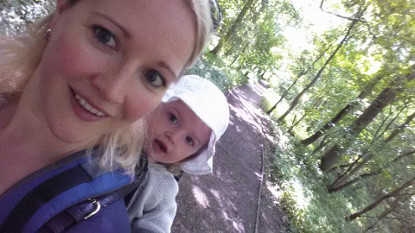Libby Binks, 37, suffered from postnatal depression after her daughter was born. Despite sharing her struggles with health professionals, she didn’t receive any support for a long time. Here’s her story.

“I struggled to cope from the day my little girl was born.
I was used to managing a team of people at work and always being 'in control', but nothing really prepares you for the total lack of control you have over a baby. I’d had a haemorrhage and was very ill after the birth, so my husband did most of the childcare whilst I was recovering.
I struggled to breastfeed. My daughter simply wouldn't go near me without crying so I expressed milk for 12 weeks instead. I felt huge pressure from society to breastfeed but my inability to feed her directly made me feel like I was failing her as a mother.
As the weeks continued I felt more and more useless, inadequate and a burden on my husband who seemed so much better at parenthood than me. I couldn't understand why I was struggling so much as my little girl was a dream baby. She slept, she didn't fuss and was simply gorgeous. Yet I couldn't see the wood for the trees. I looked at other mums with their babies and thought I was the only one feeling this way.
I would find any excuse to hand my daughter over to her dad and felt a huge sense of relief when he was 'in charge' and responsible for her. But the more I pushed my daughter away, the worse I felt. I thought I was poisoning their idyllic relationship with my sadness and inability to cope. I felt the best thing would be for me to 'disappear' and leave them both to it. They would be better off without me.

At my daughter’s six-week check, the doctor seemed to focus entirely on the baby and there was no chance for me to talk about how I was feeling.
Some time later, the heath visitor provided me with a postnatal depression survey and on reading my responses she looked at me in horror and asked in disbelief 'Do you really cry yourself to sleep?’ She told me my score was very high and that I would get more regular visits and support from a health visitor.
I didn't see a heath visitor again until my daughter's one-year check. No one contacted me at all.
I have just finished a course of counselling which I organised myself and am finally feeling better, but I wish I’d had that help two and a half years ago.
It’s taken me all this time to share my experiences with my friends and I’ve been overwhelmed by their responses. Many of them said 'I had no idea you suffered like this'. At first I couldn't understand how they hadn’t seen what I’d been going through, but then I realised that I’d been putting on a brave face for others. My daughter and I were always well-presented and on time for everything, which seemed like I was in control.
It doesn't matter what background you come from or how much money or help you have. It doesn't even matter how 'good' your baby is perceived to be. Postnatal depression is indiscriminate and can affect anyone.”
NCT’s #HiddenHalf campaign is getting postnatal mental illness out of hiding.
Show your support here. Or click here for a quick online form to send an email to your MP, pressing the government to improve postnatal check-ups, so that new mothers suffering from mental health problems can get the help they need.



